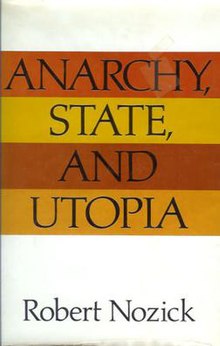Anarchy, State, and Utopia

Cover of the first edition
|
|
| Author | Robert Nozick |
|---|---|
| Country | United States |
| Language | English |
| Subject | Distributive justice |
| Published | 1974 (Basic Books) |
| Media type | Print (Hardcover and Paperback) |
| Pages | 334 |
| ISBN | |
| OCLC | 1117735 |
| 320.1/01 | |
| LC Class | JC571 .N68 |
Anarchy, State, and Utopia is a 1974 book by the American political philosopher Robert Nozick. It won the 1975 U.S. National Book Award in category Philosophy and Religion, has been translated into 11 languages, and was named one of the "100 most influential books since the war" (1945–1995) by the U.K. Times Literary Supplement.
In opposition to A Theory of Justice (1971) by John Rawls, and in debate with Michael Walzer, Nozick argues in favor of a minimal state, "limited to the narrow functions of protection against force, theft, fraud, enforcement of contracts, and so on." When a state takes on more responsibilities than these, Nozick argues, rights will be violated. To support the idea of the minimal state, Nozick presents an argument that illustrates how the minimalist state arises naturally from anarchy and how any expansion of state power past this minimalist threshold is unjustified.
Nozick's entitlement theory, which sees humans as ends in themselves and justifies redistribution of goods only on condition of consent, is a key aspect of Anarchy, State, and Utopia. It is influenced by John Locke, Immanuel Kant, and Friedrich Hayek.
The book also contains a vigorous defense of minarchist libertarianism against more extreme views, such as anarcho-capitalism (in which there is no state and individuals must contract with private companies for all social services). Nozick argues that anarcho-capitalism would inevitably transform into a minarchist state, even without violating any of its own non-aggression principles, through the eventual emergence of a single locally dominant private defense and judicial agency that it is in everyone's interests to align with, because other agencies are unable to effectively compete against the advantages of the agency with majority coverage. Therefore, he felt that, even to the extent that the anarcho-capitalist theory is correct, it results in a single, private, protective agency which is itself a de facto "state". Thus anarcho-capitalism may only exist for a limited period before a minimalist state emerges.
...
Wikipedia
